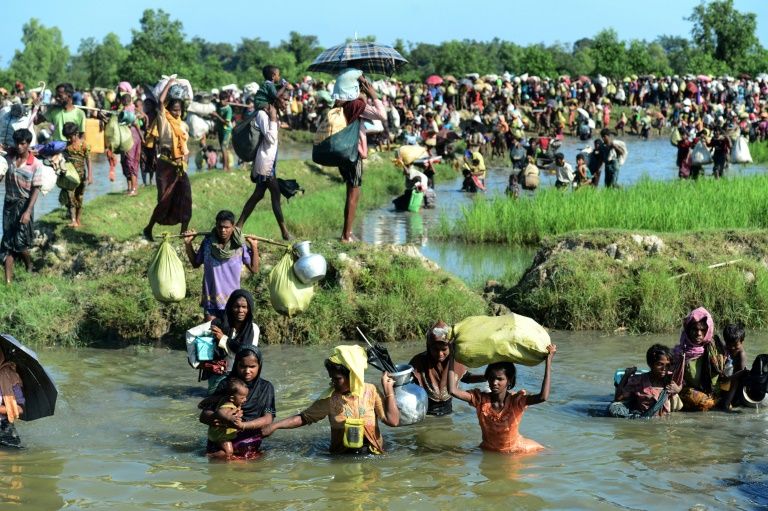Rohingya groups in ‘solidarity’ with Myanmar’s ethnic Rakhine
Recent allegations Myanmar’s military committed atrocities againt ethnic Rakhine Buddhists evoke accounts of the 2017 crackdown that forced hundreds of thousands of Rohingya Muslims to flee to Bangladesh . ©AFP/File Munir UZ ZAMAN
Yangon (AFP) – Rohingya groups around the world displayed a rare show of solidarity on Thursday with Myanmar’s ethnic Rakhine, who they say are suffering “horrifically familiar” war crimes and atrocities at the hands of the military.
The armed forces are currently locked in battle with the Arakan Army (AA), a militant group fighting for more autonomy for ethnic Rakhine Buddhists in the country’s northwest.
The area has long been a tinderbox of religious and ethnic tensions.
Military operations in 2017 forced hundreds of thousands of Rohingya Muslims to Bangladesh in violence that sees Myanmar facing genocide charges at the UN’s top court.
Ethnic Rakhine mobs stand accused of aiding soldiers to drive out the long-oppressed group.
But Thursday’s announcement from 29 Rohingya advocacy groups around the world showed signs of a potential rapprochement between the two minorities.
“Our fight for justice is a fight for everyone that has been killed, injured or abused by the Tatmadaw,” read the joint statement, referring to the military by its Myanmar name.
It accused the military of committing “war crimes and atrocities” against Rakhine civilians.
“For us Rohingya, these crimes are horrifically familiar,” it said. “We stand in solidarity with our Rakhine brothers and sisters.”
Both the military and AA militants accuse the other of human rights abuses in the ongoing unrest that has seen hundreds killed or wounded and forced some 150,000 from their homes.
On Monday, UN rights chief Michelle Bachelet slammed the military for the apparent targeting of civilians she said “may constitute further war crimes or even crimes against humanity”.
– ‘Symbolically important’ –
The alleged atrocities evoke accounts of the 2017 military crackdown, which Myanmar has justified as a means of rooting out Rohingya militants.
But the emergence last week of video confessions of two former soldiers — filmed and released by the AA — could potentially add weight to the allegations.
The soldiers detailed how they were ordered to “exterminate” Rohingya Muslims and “wipe out” their villages before taking part in the massacre of scores of men, women and children.
The military disputed the testimony, saying the confessions had been given under duress — a claim dismissed by the rebel group.
The Rakhine political parties contacted by AFP declined to comment on the Rohingya groups’ statement, though activist Nyo Aye said she welcomed their “support and solidarity”.
While the move was “symbolically important”, analyst David Mathieson said it was hard to see how it would help bring a peaceful resolution on the ground.
Inter-communal relations in Mrauk U, a town in northern Rakhine, remained as tense as ever, one Rohingya man told AFP.
He described how the Rohingyas’ movements were restricted by street patrols of ethnic Rakhine, not soldiers.
“The Rakhine do not mean us well,” he said by phone, asking not to be named.
Disclaimer: Validity of the above story is for 7 Days from original date of publishing. Source: AFP.


